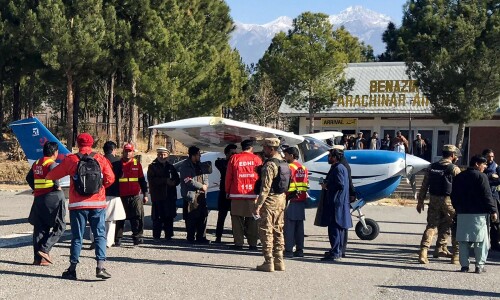PESHAWAR: Lack of rains across Khyber Pakhtunkhwa and drop in temperature in its upper regions have added to the growers’ water woes as the province has recorded more decline in irrigation water this winter than usual.
Wheat growers from the canal catchment areas of the province have had a difficult winter this year as the province had around only 6000 cusecs in the irrigation system during the lean period this year, according to the concerned officials.
“It has been a bad winter for the irrigated areas’ farmers,” said a knowledgeable official, adding that the canal network could not meet growers’ irrigation water requirements in December last year.
Khyber Pakhtunkhwa went through a prolonged dry spell this wheat growing season. As a result, wheat crop in the rain-fed areas has severely been affected whereas the standing crop in the canal based irrigated areas has also partially suffered.
Drop in canal water supplies record a sharp decline every year in December and January every year.
However, the farmers falling under the canals’ catchment areas are usually compensated by seasonal rains, which did not happen in December 2013 affecting wheat growers.
President of Anjuman-i-Kashtkaran, Khyber Pakhtunkhwa Naimat Shah Roghani told Dawn that the seasonal drop in water supplies in the canal based irrigated system had been more intense this year than usual.
“There has not been ample water this season to feed farmers through rotation turn (waar bundi) water distribution system,” he said.
The irrigation department, according to officials, operates the officially controlled canals on rotational basis, operating some in a specific week while stopping other during the same timeframe.
This allows the department to maintain the water flow at a certain speed, trying to deliver the water in the system to farmers on the tail end of canals.
However, Mr Roghani said since the canal system did not have sufficient water this season, the rotation turn basis system had not been effective.
The officials conceded that the province recorded a substantial drop in irrigation water this winter.
“Lack of rains this season compounded the situation,” said the official.
In the peak summer season, the province usually record water flows between 44,000 cusecs and 60,000 cusecs, meeting irrigation water requirements of farmers in catchment areas of all 13 canals in the province.
They, however, said the light rain in Peshawar and other parts of the province on Monday would help address the farmers’ irrigation water related problems.
However, farmers, according to Mr Roghani, have taken over by another worry as the canal network was closed on January 10 in most parts of the province for annual bhal safaee (de-silting) campaign.
Growers in the canal catchment areas want the provincial government to ensure an early completion of the de-silting exercise, said their representatives.
“The government should make sure that the canals do not remain close for more than one month as per the schedule,” said Mr Roghani, adding that wheat growers would incur losses if the system was not operated beyond February 15.












































Dear visitor, the comments section is undergoing an overhaul and will return soon.